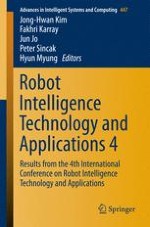2017 | OriginalPaper | Buchkapitel
Learning with Learning Robots: A Weight-Lifting Project
verfasst von : Igor Verner, Dan Cuperman, Anjali Krishnamachar, Sherri Green
Erschienen in: Robot Intelligence Technology and Applications 4
Aktivieren Sie unsere intelligente Suche, um passende Fachinhalte oder Patente zu finden.
Wählen Sie Textabschnitte aus um mit Künstlicher Intelligenz passenden Patente zu finden. powered by
Markieren Sie Textabschnitte, um KI-gestützt weitere passende Inhalte zu finden. powered by
